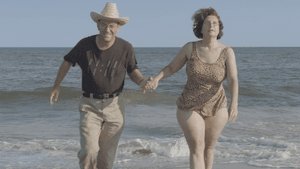Stay in the Loop
BSR publishes on a weekly schedule, with an email newsletter every Wednesday and Thursday morning. There’s no paywall, and subscribing is always free.
Love is (almost) all you need
Dan Sickles and Antonio Santini's documentary film 'Dina'

Audiences and critics alike complain there are no new cinematic tropes to be found, that the formulaic wells have run dry. The worst victim of this cruelty: the romantic comedy, a genre that currently seems stalled at pathetically aping When Harry Met Sally, but with millennials. But two local filmmakers, Fort Washington-based director Dan Sickles and codirector Antonio Santini, have found a riskier and more tender way into the rom-com form with the subtly explosive and comically dynamic Sundance-winning documentary Dina.
Featuring 49-year-old Glenside native Dina Buno and the man who would become her husband, Scott Levin, Dina follows the daily lives of these middle-aged lovers. However, the relationship has an unusual twist: Buno is dealing with multiple intellectual and behavioral disabilities and a traumatic past (hinted at throughout the film, but revealed in a startling segment near its end), and has been widowed once already. Levin has Asperger’s syndrome. The couple meet cute and move in together, and the film continues through their engagement and marriage.
Love and marriage
Buno and Levin needle each other intimately, with a musicality to their discourse that only the madly in love can get away with. Scenes on the beach in Ocean City, New Jersey, could come from a Frankie Avalon and Annette Funicello surf flick, if those ginchy kids ever talked about masturbation as often as these two do. As with any couple planning and hosting their own wedding, there are also glitches. We see the before (Dina’s racy bachelorette party, filled with her friends from an adult care center and visited by a male stripper) and after (an awkward Poconos honeymoon, complete with champagne-glass bathtub).
But there’s a brashness that comes through Dina’s simple naturalism. Buno forces Levin to look at the truths in their relationship, both good and bad; they, like any other couple, are committed to working through those issues. Their families also figure into the story: Levin has only ever lived at home with his parents, and Buno's mother seems to undercut her fierce sense of independence at every turn. Yes, Buno has had pain in her life beyond being neurodiverse, and her mother has good cause to worry, but like Valerie Harper’s Rhoda, or Katherine Hepburn’s Tracy Lord, Dina's indomitable spirit always wins — and she usually comes through with a laugh line.
What makes Dina purr is that Sickles and Santini simply allow their characters’ lives to unfold organically. There is no finger-pointing toward disease and victory, no marveling at daily minutiae. These second-time directors (their first film, Mala Mala, focused on a group of Puerto Rican trans women) simply let the warm feelings, good humor, and genuine — often innovative — silliness of two lovers go by, unchecked and unrestrained.
What, When, Where
Dina. Antonio Santini and Dan Sickles directed. Philadelphia-area showtimes.
Sign up for our newsletter
All of the week's new articles, all in one place. Sign up for the free weekly BSR newsletters, and don't miss a conversation.
 A.D. Amorosi
A.D. Amorosi